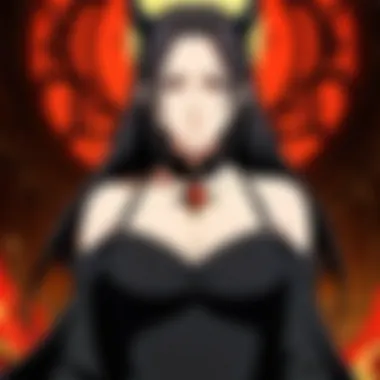Exploring the English Dub of 'The Testament of Sister New Devil'


Intro
'The Testament of Sister New Devil' is a compelling anime series that has gathered much attention. With its unique blend of fantasy, action, and romance, the series invites viewers into a world where supernatural elements intertwine with everyday life. The English dub of this series plays a vital role in its appeal, especially to Western audiences. In this article, we will explore the characters, themes, and the cultural significance of this adaptation. The aim is to provide an in-depth look at why this anime resonates with so many.
Character Profiles
Overview of Main Characters
The series revolves around several integral characters, each contributing to the storyline in meaningful ways.
- Basara Toujou: A seemingly ordinary high school student, Basara is thrust into a conflict between demons and humans. His character evolves from a passive individual to a protector as he confronts his complicated heritage.
- Miyuki Toujou: Basara’s younger sister, she holds a significant role, not just as a sibling but as a powerful entity in the narrative. Her character often challenges Basara's decisions, adding depth to their relationship.
- Sister Maria: A demon who initially appears as a villain but is revealed to have a more nuanced character. Maria's arc represents themes of redemption and loyalty.
- Yuki Nonaka: An enigmatic character who adds mystery and tension to the plot. Yuki’s interactions with Basara hint at deeper connections than first perceived.
Supporting Characters
Supporting characters also enhance the story.
- Kurumi Nonaka: Yuki’s sister and a demon, who injects humor and asks interesting questions about morality.
- Benio: Another demon who plays an antagonistic role. Her motivations are often complex, as she represents the struggle between different factions within the story.
Each of these characters has distinct attributes that resonate with viewers.
Theme Exploration
Central Themes
'The Testament of Sister New Devil' explores themes of power, loyalty, and identity. The narrative examines how individuals balance their desires with their duties. The concept of family, especially evident in the relationship between Basara and Miyuki, illustrates how personal relationships shape one's choices.
Cultural References
The English dub brings forth cultural nuances that may not be immediately apparent in the original Japanese version. References to Western societal norms, combined with traditional Japanese elements, create a unique cultural tapestry. This duality enriches the viewer's experience, making it accessible and relatable to a diverse audience.
Viewer Reception
The reception of the English dub has been largely positive. Audiences appreciate the voice acting and how the dubbed version maintains the essence of the original while making adjustments for cultural relevance. The connection that viewers feel with the characters enhances their engagement with the series.
"The English dub provides a new layer to understanding character motivations, making it a worthy adaptation of the original work."
Closure
In examining the English dub of 'The Testament of Sister New Devil,' one finds that it is more than just an adaptation; it is a bridge connecting cultures. The intricate layering of characters and themes speaks to universal experiences while retaining specificity in its cultural references. As audiences delve into this series, they not only enjoy an engaging story but also engage with deeper inquiries about identity, loyalty, and the nature of power.
Understanding these aspects elevates the viewing experience and demonstrates why 'The Testament of Sister New Devil' continues to captivate an international audience.
Overview of 'The Testament of Sister New Devil'
Understanding 'The Testament of Sister New Devil' is crucial for appreciating its layered narrative and character interactions. The series has gained a significant following, and its English dub offers a different lens through which to experience the story. This overview will help establish the primary themes and concepts conveyed in the series.
Synopsis of the Series
'The Testament of Sister New Devil' follows the life of Basara Toujou, who finds himself in a complicated situation after he becomes the guardian of two demon girls, Mio Naruse and Maria Campbell. Character dynamics evolve as family secrets and power struggles unfold. The blend of action, fantasy, and romance makes it captivating. The mix of humor and serious moments creates a balanced narrative.
Production Details
Studio Information


The anime was produced by Production IMS, known for their involvement in other popular titles. Its contribution to this series is seen in the high-quality animation and character design. Production IMS specializes in anime that combines both visual appeal and storyline depth. This studio’s animation style helps to enhance the dramatic elements of the series, making important scenes more impactful.
Director and Staff
Yoshihiro Nishikubo, the director, has a track record of directing properties that emphasize character-driven stories. The choice of director is beneficial as it ensures that character emotions are effectively portrayed. Nishikubo’s background in adapting complex narratives allows for a thoughtful approach to storytelling. His unique vision helps unite various elements into a cohesive presentation.
Source Material
The series is adapted from Tetsuto Uesu’s light novel series. This source material provides a robust foundation for character development and world-building. The light novels’ intricate plots and character motivations lend themselves well to screen adaptation. One unique feature of the source material is its detailed character backstories, which enrich the viewer's experience and understanding.
Character Analysis
Character analysis in any narrative work is crucial, as it provides insight into the motivations, growth, and dynamics of the individuals shaping the story. In the context of 'The Testament of Sister New Devil', understanding the characters enhances our appreciation of the plot, themes, and the overall emotional resonance of the series. Characters are not merely vessels for the storyline; they embody the central themes and conflicts that arise. Each character's unique traits contribute to the narrative depth, allowing viewers to engage with the material on multiple levels.
Main Characters
Basara Toujou
Basara Toujou stands as a pivotal figure within the series. His character embodies the archetype of the reluctant hero, burdened with responsibilities he initially wishes to avoid. His key characteristic is his protective nature towards those he cares about, especially the two main female characters. This trait not only makes him a respectable figure among fans but also allows for meaningful interactions that propel the narrative forward. A unique feature of Basara is his dual heritage, which grants him access to unique powers. This aspect adds layers to his character, serving both as an advantage and a source of conflict. His internal struggles with identity and duty create a rich storyline that resonates with viewers, making him a compelling focal point in the English dub adaptation.
Mio Naruse
Mio Naruse is another central character whose journey is inherently linked to the series' thematic essence. As the reincarnation of a demon lord, her inherent power contrasts with her vulnerability as she navigates her new life. Mio's key characteristic is her fierce loyalty to her friends, stemming from her complex past and experiences. This loyalty makes her a relatable figure, particularly for viewers who appreciate strong emotional bonds. A significant aspect of Mio's character is her evolution throughout the series, shifting from a state of fear to one of empowerment. This transformation is crucial in driving the plot and showcasing the themes of self-discovery and growth. Her emotional depth presents both advantages and challenges in the English dub, as voice actors need to capture this complexity accurately.
Maria Campbell
Maria Campbell supports the main duo and serves as both comic relief and a source of wisdom. Her character is defined by her playful demeanor, contrasting with the somewhat serious tones of both Basara and Mio. This characteristic makes her an enjoyable addition to the storyline and appeals to audiences looking for lighthearted interactions amidst more profound conflicts. A unique feature of Maria is her knowledge as a former demon, enabling her to provide insight into the supernatural elements of the series. While her humor enhances the viewing experience, it also poses a challenge in the English dub. Balancing her lightheartedness with serious moments requires a nuanced approach from the voice cast.
Supporting Characters
Yuki Nonaka
Yuki Nonaka acts as a bridge between the human world and the supernatural realm. Her importance lies in her growth from a secondary character into someone who has an essential role in Basara's life. A key characteristic of Yuki is her unwavering bravery, which positions her as a vital ally to the main protagonists. Her journey reflects common themes of friendship and fidelity, appealing to viewers who value supportive relationships. However, her sporadic character development can create some challenges in the narrative flow, which the English dub must address to maintain viewer engagement.
Zariel
Zariel represents the antagonistic force that pushes the plot's conflicts. As a powerful demon, her key characteristic is her cunning intelligence, making her a formidable opponent to Basara and Mio. Zariel’s unique feature is her ability to manipulate those around her, adding a layer of complexity to the confrontation between characters. This dynamic allows the series to explore themes of manipulation and trust. While substantial in narrative contribution, her character can seem one-dimensional at times, which necessitates a well-crafted portrayal in the English dub.
Chloe
Chloe plays the role of the enigmatic ally, often shrouded in mystery, which intrigues the audience. Her key trait is cunning adaptability, allowing her to navigate both friend and foe alike. This quality makes her unpredictable and adds tension within the narrative. Chloe's unique feature is her knowledge of multiple realms and their interactions, positioning her as a crucial player in the unfolding drama. However, the ambiguity of her intentions can confuse the audience, which poses a challenge for voice actors aiming to convey clarity in the English dub.
By delving into the character analysis of 'The Testament of Sister New Devil', readers gain insight into how these individuals contribute to the broader themes of the series. Each character enriches the plot and resonates with viewers, illuminating the intricacies of relationships, growth, and moral dilemmas present in the narrative.
Themes and Motifs
Themes and motifs play a crucial role in any narrative, including The Testament of Sister New Devil. They serve as the backbone, influencing character development and overall plot progression. For viewers, recognizing these elements enhances their understanding and appreciation of the series. In this section, we will explore three significant themes: identity and transformation, power dynamics, and family and bonds. Each of these motifs enriches the storytelling and provides layers of meaning to character actions and the situations they face.
Identity and Transformation
Identity is a central theme in The Testament of Sister New Devil. Characters undergo significant personal changes throughout the series. Basara Toujou, who initially appears as an ordinary high school student, evolves in response to the challenges he faces. This change is not merely external; it reflects an internal struggle with responsibility, belonging, and self-acceptance. The transformation extends to Mio Naruse, who grapples with her heritage as a demon. Her journey to embrace her identity highlights the conflict between personal desires and societal expectations.
Transformation is often depicted visually through character design changes, but its depth lies in emotional growth. The narrative uses this theme to question what it means to be true to oneself in a world filled with expectations. The incorporation of identity and transformation makes the series relatable, as viewers may see reflections of their own struggles.
Power Dynamics


Power dynamics form another pivotal theme within the series. The struggle for power is evident not just between humans and supernatural beings, but also among the characters themselves. Basara's initial position as a reluctant hero flips as he learns about the complexities of power, authority, and influence. His unique abilities further complicate these dynamics, leading to moments of tension and confrontation.
The story explores how power can corrupt, and the ethical dilemmas associated with wielding it. Characters like Zariel illustrate the extremes of power's influence, showcasing a blend of vulnerability and authority. Recognizing these dynamics allows viewers to delve deeper into the motivations behind character interactions and decisions.
Family and Bonds
At its core, The Testament of Sister New Devil delves into the theme of family. The series emphasizes the importance of bonds, both biological and chosen. The connection between Basara and Mio grows from a mere contractual obligation to a profound familial relationship. Their evolving chemistry speaks volumes about the nature of trust, loyalty, and love.
In addition to Basara and Mio's relationship, the series addresses sibling bonds and friendships. The presence of characters like Maria Campbell reinforces the idea that family extends beyond DNA. These connections become essential during crises, serving as a source of support and motivation. The portrayal of family and bonds adds emotional weight to the series, making it resonate with the audience on a personal level.
Understanding these themes enriches the viewing experience. Each motif unveils layers of complexity, engaging the audience's intellect and emotions.
The English Dub Experience
The experience of watching an English dub of an anime can significantly influence how viewers perceive and connect with the story. Dubbing allows a broader audience to engage with the series without language barriers. This is particularly crucial for a show like 'The Testament of Sister New Devil,' which has complex themes and character dynamics. The English dub not only conveys dialogue but also attempts to maintain the tone, emotion, and cultural nuances of the original series.
The professional cast and technical expertise involved in creating a quality dub can enhance or detract from the storytelling. Fans often appreciate the localization efforts that help them resonate with characters and plots on a personal level, allowing for a deeper understanding of the cultural context and character motivations. Despite the challenges inherent in this process, effective dubbing can bring new life and perspective to an anime series.
Overview of the English Dub
The English dub of 'The Testament of Sister New Devil' was crafted to cater to an international audience, ensuring that essential themes were retained while making the content accessible in a different language. The adaptation aimed to preserve the essence of the original dialogue while catering to the interests and cultural references of English-speaking viewers.
This adaptation serves multiple purposes; it's not solely about translating words but also about carrying over emotional weight. A successful dubbing experience creates an engaging interaction with the audience, making it both relatable and enjoyable. Furthermore, the localization process understands not just language but also cultural implications, enhancing viewer appreciation.
Voice Cast
Lead Voice Actors
The lead voice actors in the English dub play a key role in shaping the viewer's perception of characters. Stars such as Josh Grelle voice Basara Toujou, lending a distinct personality that matches the character's complexities. Grelle’s performance is recognized for its authenticity and emotional depth, which is crucial given Basara's character journey throughout the series.
The decision to select skilled voice actors for lead roles enhances viewer connection. They bring characters to life, ensuring that audiences relate to their struggles and triumphs. Many fans appreciate how well Grelle’s delivery resonates with the original intent of the character, illustrating a seamless integration between the source material and the English adaptation. This connection adds to the overall viewing experience, heightening emotional resonance.
Supporting Cast
The supporting cast in the English dub also contributes significantly to the overall narrative experience. Actors like Madison Lee as Mio Naruse and Faye Mata as Maria Campbell each bring unique traits that complement the leads. Lee��’s portrayal of Mio captures the character's multifaceted nature, balancing strength and vulnerability. The chemistry between the lead and supporting actors creates an engaging dynamic that enriches the storyline.
The supporting cast provides essential layers to the narrative, often highlighting themes of friendship and loyalty. A strong supporting voice cast can elevate the entire viewing experience, ensuring each character feels impactful and memorable.
Dubbing Techniques and Challenges
Translation Choices
Translation choices in dubbing can be quite challenging, as they greatly affect how viewers understand and experience the series. Translating culturally specific references while maintaining the original emotion is a delicate task. For instance, maintaining character quirks and colloquial expressions is essential for keeping the show's tone intact.
A good translation not only communicates the literal meaning but also captures subtleties. The translators have to strike a balance between accuracy and entertainment value. This choice affects how viewers perceive character interactions and motivations throughout the series.
Adaptational Changes
Adaptational changes also play a role in how the English dub diverges from its original version. Dubbing often requires modifications to dialogue to fit lip movements and maintain pacing. Some cultural references may be altered or removed entirely to better suit the target audience.
While these changes may sometimes frustrate purists, they can also introduce new elements that may appeal to viewers unfamiliar with Japanese culture. This aspect of dubbing is crucial as it can either enhance the viewing experience or leave viewers feeling disconnected from the narrative. Understanding these adaptational shifts can provide deeper insight into the creative process behind the English dub.
Cultural Context


Understanding the cultural context of The Testament of Sister New Devil is crucial for grasping its narrative depth and thematic intricacies. The series encapsulates various elements of Japanese culture, intertwining them with personal and societal conflicts. This context enhances the viewing experience, especially for those unfamiliar with the intricacies of Japanese societal norms and values. By diving into this cultural framework, viewers can appreciate the nuances that shape character motivations and story arcs. Moreover, analyzing the cultural implications also fosters a greater understanding of the series’ reception around the globe.
Japanese Culture in 'The Testament of Sister New Devil'
In The Testament of Sister New Devil, several aspects of Japanese culture play pivotal roles. One of the most prominent themes is the concept of family. Traditional Japanese family structures are often emphasized through the relationships portrayed in the series. Basara’s protective instincts towards Mio are reflective of the shi nai, a term that denotes familial loyalty and protection. This is particularly relevant given the struggles of Mio as a half-demon, illustrating the complexities of identity in Japanese society.
Additionally, the series draws on elements from Shinto, Japan's indigenous spirituality. The presence of supernatural entities aligns with Shinto beliefs, where spirits play integral parts in daily life. This cultural undercurrent adds layers to the storyline, presenting conflicts that stem from both personal choices and cultural expectations.
Furthermore, the portrayal of power dynamics resonates with the historical hierarchy within Japan. Characters like Zariel and Maria embody the consequences of power struggles, which can symbolize broader societal conflicts, including those at the political level.
Global Reception and Impact
The global reception of The Testament of Sister New Devil has been diverse, mirroring its cultural nuances. In countries with different cultural backgrounds, the series was met with mixed responses. Some viewers appreciate the depth of the character arcs and themes, while others focus on the more contentious elements, such as fanservice and the portrayal of gender roles.
The anime has sparked discussions on platforms like Reddit, where fans dissect its themes and cultural references. > "The series reflects a blend of traditional values and modern challenges faced by youth. It’s this juxtaposition that draws in international audiences," a fan noted.
Moreover, the show's impact can be felt in online communities and social networks. On Facebook, groups dedicated to discussions about the series thrive, indicating its resonance with viewers outside Japan. These conversations often address how cultural nuances can be perceived differently, enriching the dialogue surrounding the series.
Overall, the cultural context not only frames the narrative of The Testament of Sister New Devil but also shapes its perception worldwide. Engaging with these aspects enhances understanding and appreciation, crucial for anime and manga enthusiasts.
Viewer Reception and Criticism
Understanding viewer reception and criticism is vital for any analysis of a media work, including The Testament of Sister New Devil. This section delves into how audiences perceive and react to the series alongside professional critiques. It serves not only to highlight individual opinions but also to illustrate how these perceptions shape the overall reputation of the show in the anime community.
Fan Reactions
Fans of The Testament of Sister New Devil have had a varied response to the series, particularly focusing on its characters and their development. Many viewers express appreciation for the intricate dynamics between Basara and Mio. They have noted how the evolving relationship keeps the viewers engaged throughout the plot. Some fans take to online forums such as Reddit to discuss their favorite moments, showcasing their attachment to these characters.
On platforms like Facebook, groups dedicated to anime often promote discussions about favorite episodes and themes. This community engagement highlights the series' impact on viewers and their willingness to advocate for it.
Additionally, many fans provide critical feedback on social media regarding aspects like pacing and the portrayal of certain themes. The reaction can be polarized; while some applaud the bold yet sensitive approach to character arcs, others express concern over the elements that they disapprove of. Overall, fan reactions remain a significant aspect of how the series stays relevant in discussions related to modern anime storytelling.
Critical Reviews
Critics have also weighed in on The Testament of Sister New Devil, bringing an analytical perspective to its strengths and shortcomings. Reviews often address the storytelling approach and character depth, focusing on how these aspects resonate beyond the surface level. Some reviews suggest that the series effectively balances action with character-driven narratives.
The animation quality has received praise from numerous critics, particularly for its vibrant and dynamic scenes. However, reviewers also point out pacing issues in certain areas, which cause interruptions in the narrative flow. This kind of critique is essential for potential viewers who come across such reviews before deciding to watch the series.
"The Testament of Sister New Devil manages to mix action and romance, but struggles with pacing.
Critical reviews often appear in specialized publications or forums, where animators and enthusiasts discuss the effectiveness of character arcs amidst action-packed sequences. The critical lens offers valuable insights, allowing new viewers to form informed opinions as they engage with the series.
In summary, viewer reception and criticism provide a well-rounded understanding of how The Testament of Sister New Devil is regarded both by its fanbase and by critics. This section exemplifies the importance of audience feedback and professional critique, serving to highlight both the show's appeal and areas for improvement.
Culmination
The importance of the conclusion in this article lies in its ability to synthesize the previously discussed elements of 'The Testament of Sister New Devil,' particularly focusing on its English dub. A conclusion serves as a reflective space where readers can revisit critical points and gain a comprehensive understanding of the anime's broader significance.
In discussing the key takeaways, it is crucial for the reader to grasp the intricate relationship between anime production and viewer perception. Through the examination of character arcs and thematic depth, one can appreciate how the English dub encapsulates these elements while also adapting to an international audience. Furthermore, reflections on viewer criticism reveal the diverse opinions surrounding the dubbing choices, highlighting varying cultural interpretations.
Additionally, the conclusion allows for contemplation on the benefits of English dubs in anime. For many, it enhances accessibility and enjoyment, breaking down language barriers that could otherwise deter engagement with the narrative. Importantly, considerations about the dubbing experience can impact future projects in the anime industry, potentially shaping creative decisions based on viewer preferences.
Key Takeaways
- Cultural Adaptation: The English dub of 'The Testament of Sister New Devil' showcases an effective adaptation of cultural elements, making it appealing to a broader audience.
- Character Depth: Key characters such as Basara, Mio, and Maria are portrayed with emotional nuance, allowing viewers to form connections despite language differences.
- Viewer Reception: Responses from fans often reveal contrasting opinions, demonstrating the subjective nature of dubbing and its crucial role in anime appreciation.
Final Thoughts on the Dubbing Experience
The dubbing experience in 'The Testament of Sister New Devil' exemplifies both the challenges and triumphs of anime localization. Voice acting choices can significantly influence how characters are perceived, impacting viewer engagement with the story. The balance between staying true to the original material and adapting to cultural contexts is delicate yet vital.
Overall, experiences such as these enrich the anime landscape. They invite discussions about preferences in voice acting, translation fidelity, and cultural nuances. As fans explore the English dub of this series, it serves as a testament to how dubbing shapes the global anime experience, enhancing its reach and influence.







